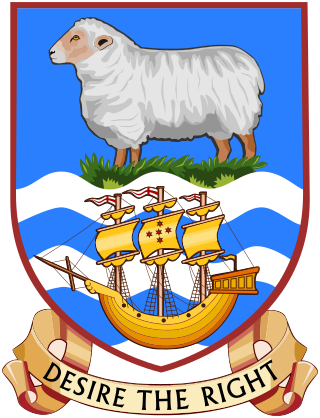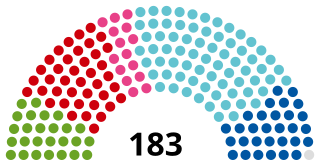
The politics of the Falkland Islands takes place in a framework of a constitutional monarchy and parliamentary representative democratic dependency as set out by the constitution, whereby the Governor exercises the duties of head of state in the absence of the monarch and the Chief Executive is the head of the Civil Service, with an elected Legislative Assembly to propose new laws, national policy, approve finance and hold the executive to account.

The Bill of Rights 1689 is an Act of the Parliament of England that set out certain basic civil rights and changed the succession to the English Crown. It remains a crucial statute in English constitutional law.
Rights are legal, social, or ethical principles of freedom or entitlement; that is, rights are the fundamental normative rules about what is allowed of people or owed to people according to some legal system, social convention, or ethical theory. Rights are an important concept in law and ethics, especially theories of justice and deontology.
"Prerogative writ" is a historic term for a writ that directs the behavior of another arm of government, such as an agency, official, or other court. It was originally available only to the Crown under English law, and reflected the discretionary prerogative and extraordinary power of the monarch. The term may be considered antiquated, and the traditional six comprising writs are often called the extraordinary writs and described as extraordinary remedies.

The National Council is one of the two houses of the Austrian Parliament and is frequently referred to as the lower house. The constitution endows the National Council with far more power than the Federal Council.
A pardon is a government decision to allow a person to be relieved of some or all of the legal consequences resulting from a criminal conviction. A pardon may be granted before or after conviction for the crime, depending on the laws of the jurisdiction.
Landmark court decisions, in present-day common law legal systems, establish precedents that determine a significant new legal principle or concept, or otherwise substantially affect the interpretation of existing law. "Leading case" is commonly used in the United Kingdom and other Commonwealth jurisdictions instead of "landmark case", as used in the United States.
Corporative federalism is a system of federalism not based on the common federalist idea of relative land area or nearest spheres of influence for governance, but on fiduciary jurisdiction to corporate personhood in which groups that are considered incorporated members of their own prerogative structure by willed agreement can delegate their individual effective legislature within the overall government.

Liberty is the state of being free within society from oppressive restrictions imposed by authority on one's way of life, behavior, or political views. The concept of liberty can vary depending on perspective and context. In the Constitutional law of the United States, Ordered liberty means creating a balanced society where individuals have the freedom to act without unnecessary interference and access to opportunities and resources to pursue their goals, all within a fair legal system.
A constitutional right can be a prerogative or a duty, a power or a restraint of power, recognized and established by a sovereign state or union of states. Constitutional rights may be expressly stipulated in a national constitution, or they may be inferred from the language of a national constitution, which is the supreme law of the land, meaning that laws that contradict it are considered unconstitutional and invalid. Usually any constitution defines the structure, functions, powers, and limits of the national government and the individual freedoms, rights, and obligations which will be protected and enforced when needed by the national authorities. Nowadays, most countries have a written constitution comprising similar or distinct constitutional rights.

The Federal Constitution of the Swiss Confederation of 18 April 1999 is the third and current federal constitution of Switzerland.

Equality before the law, also known as equality under the law, equality in the eyes of the law, legal equality, or legal egalitarianism, is the principle that all people must be equally protected by the law. The principle requires a systematic rule of law that observes due process to provide equal justice, and requires equal protection ensuring that no individual nor group of individuals be privileged over others by the law. Also called the principle of isonomy, it arises from various philosophical questions concerning equality, fairness and justice. Equality before the law is one of the basic principles of some definitions of liberalism. It is incompatible with legal slavery.
Presser v. Illinois, 116 U.S. 252 (1886), was a landmark decision of the Supreme Court of the United States that held, "Unless restrained by their own constitutions, state legislatures may enact statutes to control and regulate all organizations, drilling, and parading of military bodies and associations except those which are authorized by the militia laws of the United States." It states that the Second Amendment to the United States Constitution limited only the power of Congress and the national government to control firearms, not that of the states, and that the right to peaceably assemble in the First Amendment to the United States Constitution was not protected by the clause referred to except to petition the government for a redress of grievances. This decision was overruled in McDonald v. City of Chicago in (2010).
Civil liberties in the United Kingdom are part of UK constitutional law and have a long and formative history. This is usually considered to have begun with Magna Carta of 1215, a landmark document in British constitutional history. Development of civil liberties advanced in common law and statute law in the 17th and 18th centuries, notably with the Bill of Rights 1689. During the 19th century, working-class people struggled to win the right to vote and join trade unions. Parliament responded with new legislation beginning with the Reform Act 1832. Attitudes towards suffrage and liberties progressed further in the aftermath of the first and second world wars. Since then, the United Kingdom's relationship to civil liberties has been mediated through its membership of the European Convention on Human Rights. The United Kingdom, through Sir David Maxwell-Fyfe, led the drafting of the Convention, which expresses a traditional civil libertarian theory. It became directly applicable in UK law with the enactment of the Human Rights Act 1998.
Managerial prerogatives are also referred to as the functions and rights of management, is considered as the discretion of the employer or manager on how to manage its business, not bound by collective bargaining. It is a term that easily leads to widespread misunderstanding. Different circles have different interpretations of this term. When it is used in the trade unions circles, is perceived as a user's support for unilateral management power and can cause protests.When used by the management circle, It is considered as exclusive right and control right without interference. Managerial prerogatives give employers or managers the power to control the direction in which their businesses are heading. Employees basically do not have this power.

The royal prerogative is a body of customary authority, privilege, and immunity attached to the British monarch, recognised in the United Kingdom. The monarch is regarded internally as the absolute authority, or "sole prerogative", and the source of many of the executive powers of the British government.

The constitution of the United Kingdom comprises the written and unwritten arrangements that establish the United Kingdom of Great Britain and Northern Ireland as a political body. Unlike in most countries, no official attempt has been made to codify such arrangements into a single document, thus it is known as an uncodified constitution. This enables the constitution to be easily changed as no provisions are formally entrenched.
An individual is one that exists as a distinct entity. Individuality is the state or quality of living as an individual; particularly as a person unique from other people and possessing one's own needs or goals, rights and responsibilities. The concept of an individual features in many fields, including biology, law, and philosophy. Every individual contributes significantly to the growth of a civilization. Society is a multifaceted concept that is shaped and influenced by a wide range of different things, including human behaviors, attitudes, and ideas. The culture, morals, and beliefs of others as well as the general direction and trajectory of the society can all be influenced and shaped by an individual's activities.
The royal prerogative is a body of customary authority, privilege, and immunity recognized in common law as belonging to the sovereign, and which have become widely vested in the government. It is the means by which some of the executive powers of government, possessed by and vested in a monarch with regard to the process of governance of the state, are carried out.

R (Miller) v Secretary of State for Exiting the European Union is a United Kingdom constitutional law case decided by the United Kingdom Supreme Court on 24 January 2017, which ruled that the British Government might not initiate withdrawal from the European Union by formal notification to the Council of the European Union as prescribed by Article 50 of the Treaty on European Union without an Act of Parliament giving the government Parliament's permission to do so. Two days later, the government responded by bringing to Parliament the European Union Act 2017 for first reading in the House of Commons on 26 January 2017. The case is informally referred to as "the Miller case" or "Miller I".








